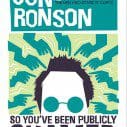‘This is a book about us’, Ronson intones on his latest sell-out tour, ‘About how good people just like us are tearing apart people just like us out of a desire to do good.’
His other books have always been about sinister, anonymous oddballs; terrorists, the military, psychopaths, Frank Sidebottom. This time, Ronson warns, we’re the weirdoes.
It all started in 2012 when Ronson’s online identity was hijacked by an imposter @jon_ronson who posted random comments about fusion food and fancy soirees. After a bit of investigating, he found it was the creation of academic Luke Robert Mason. Thinking it would be a simple case of requesting the ‘spambot’ ceased, Ronson messaged Mason only to be told, ‘The infomorph isn’t taking your identity. It is repurposing social media data into an informorphic aesthetic.’ ‘I felt a tightness in my chest,’ Ronson writes, ‘I was at war with a robot version of myself.’
Inviting Luke and colleagues Dan and David round to talk about it, Rosnon set up a camera to capture their side of the story. They refused to back down:
‘‘You’re saying, ‘There is only one Jon Ronson’…and you want to maintain that integrity and authenticity. Yes?’
I stared at him.
‘I think we feel annoyed with you, because we’re not quite persuaded by that. We think there’s already a layer of artifice and it’s your online personality – the brand Jon Ronson – you’re trying to protect. Yeah?’
‘NO, IT’S JUST ME TWEETING,’ I yelled.
‘The internet is not the real world,’ said Dan.’
Ronson posted this video online and waited to be told he was overreacting. Instead, fans waded in against the evil geniuses, posting comments that became increasingly deranged. ‘I hope nobody’s going to actually hurt them,’ Jon worried at one point, realising he had instigated a small act of public shaming. He thought back to the mass humiliations he had seen and been a part of online, and wondered what consequences this had for the victims. It seemed the academics’ defence, that ‘the internet is not the real world’, was patently false. By the end of Ronson’s account of his investigation, it’s clear that online shaming wouldn’t be nearly so bad if it didn’t have such IRL effects (redundancy, remorse, fear of rape).
Guilty of minor indiscretions, Ronson’s interviewees all had their lives ripped up and tossed like confetti to the freak winds of the blogosphere. Jonah Lehrer was a pop psychologist whose bestseller Imagine contained a few fabricated Bob Dylan quotes; nobody noticed until a struggling journalist did some fact-checking and wrote an exposé. Lindsey Stone had her photo taken jokily ‘up yours’-ing an American war memorial; she was taken deadly seriously. Justine Sacco’s story is perhaps the most terrifying of all. She was the PR who joked about being safe from AIDS because she was white; as she travelled obliviously on an international flight she became the no. 1 trending topic on Twitter. By the time she touched down, her life was in ruins. Just like us, all three were normal, flawed people, but because of people like us they had to go into hiding; Twitter’s echo chamber shook with our deafening denunciations.
‘We’re a toddler crawling towards a loaded gun’, Ronson tells us, the internet’s perfect machine turning lethal in our hands, like a car that’s great until you crash. At the end of the book, he quotes a journalist who calls the internet a volatile parent you have to ‘tiptoe’ around. The problem with these analogies is that we look like the innocent ones, as if we don’t know what we’re really doing when we compose nasty comments and click send. Ronson uses the word ‘eerie’ early on, suggesting something both creepy and uncanny. It’s an idea left unexplored but by the end of the book I was left wondering whether the Internet Us, no matter how much we think we are being ourselves, is someone else entirely. Perhaps the academics were right; we all have a brand to protect. We are all own own spambots.
‘Shame internalised is horror,’ Ronson tells us, ‘shame let out is a funny story.’ Every writer’s favourite thing is to find someone else’s story and make it their own. Their worst nightmare is to have it happen to them. This is perhaps why after his initial anecdote, where Jon escapes the clutches of his evil replica, Ronson remains curiously absent from the rest of the book. He makes vague confessions along the way to being part of the problem, joining in mass Twitter pile-ons, but is careful not to name names. Ronson even attends a ‘Radical Honesty’ workshop, where people go to become shame-free, but frustratingly manages to avoid incriminating himself; he escapes the Hot Seat literally. It’s an evasiveness which is always there in his work but is usually just endearing. This may be a book about ‘us’, but we’re something he can hide behind.
This is perhaps why he ignores the fascinating phenomenon of celebs who use fans as weapons. Take the 2012 spat between art critic Waldemar Januszczak and art comedian Noel Fielding after he suggested that Fielding shouldn’t be an art presenter. Within hours, General Fielding had mobilised his footsoldiers into all-out assault. After a day or so of Twitter attrition, Fielding called them off; by then the shaming had burned itself out. There’s a taster of this power-play in Ronson’s glee at the shaming of the academics who stole his identity, but he is very careful not to condemn his avengers.
This is a very funny book about an extremely terrifying topic, a phenomenon which is still unfolding in real time. It offers no easy answers, which is good, but Ronson’s self-preservation strategy has left the book curiously unfulfilling. He has also missed an opportunity to predict what now seems inevitable – that a spambot will someday soon ruin someone’s life. Not quite Skynet, I know, but something equally eerie.
So You’ve Been Publicly Shamed is out now by Picador.
Jon Ronson – So You’ve Been Publicly Shamed book review by Alex Murray







